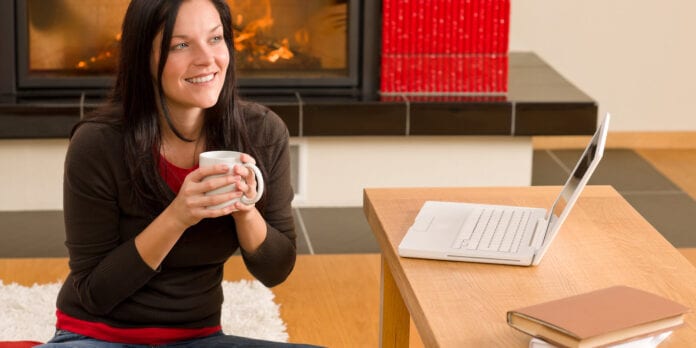- Updated Government guidelines aimed at curbing the spread of Coronavirus means millions are set for a winter working from home
- Workers could be missing out on £312 towards household bills per YEAR
- Turning your heating down by just 1 degree could save you £80 per year
Many UK workers have returned to working from home after the UK Government pulled its advice on heading back to the office, and with winter approaching and bills already set to rise as Brits reach for the thermostat, households could be about to see their outgoings soar.
To help people tackle rising bills, data experts at the home energy-saving assistant Loop have shared some simple steps to help reduce energy usage, and make sure your home is as efficient as possible to avoid unwelcome costs this winter.
Below are Loop’s tips for keeping your energy use in check while working from home this winter:
- Check your expenses
While home working may be the norm for some, many UK workers will be setting up a home office as a temporary measure in order to help curb the spread of Coronavirus.
For workers who are usually office-based, tax relief is available to help offset some of the cost associated with working from home. Workers can claim £6 per week (that’s over the course of a year) to cover additional costs such as rising energy bills. You can find out if you’re eligible here, or speak directly to your employer.
Steve Buckley, Head of Data Science at Loop, says: “A saving of over £300 is not to be sniffed at, and with so many of us setting up a home office, there are potentially millions going unclaimed at the moment.
“It’s difficult to show exactly how much more energy you use while working from home, so HMRC allows workers to claim a flat rate of £6 per week. It’s worth taking a look at the government website or speaking to your employer to find out the easiest way for you to claim.”
- Utilise the Green Homes Grant
Those working at home could lose out even more if they don’t take steps to improve their home efficiency with the colder, darker months ahead. Not only will it mean paying to light and heat your home when you would normally be at work, if your home is inefficient you could be wasting energy and money in the process too.
Loop suggests now is the time to consider making some permanent changes to your home to improve its efficiency.
Steve Buckley suggests: “if working from home is going to be a long-term arrangement for you, the government’s Green Homes Grant could offer the perfect opportunity for you to make improvements to both the efficiency of your home, and its environmental impact.
“The voucher scheme will help cover the cost of making energy efficient improvements, and can be used to complete a range of projects, from insulating your home and reducing how much it costs to heat to installing low-carbon heating to cut your home’s impact on the environment.”
“There’s not much time to waste, though. Vouchers need to be redeemed and all improvements completed by 31 March 2021, so now’s the time to do your research.”
If you’re considering making additional changes to your home to prioritise sustainability, Loop suggests exploring whether solar panels are right for you.
Steve continues: “Higher daytime occupancy means more houses than ever could make great use of solar panels. Although this wouldn’t be covered by the Green Homes Grant, it’s one of the best ways to clean up your energy use and reduce your impact on the environment. For a typical installation you are effectively buying half price electricity for the next 25 years.”
Solar panels are even more worthwhile if you drive an electric vehicle or are considering changing to one. EVs enjoy lower running costs and have big environmental benefits – when paired with solar panels you can even get free fuel!”
- Beware the Phantom Load
Steve Buckley says: “Spending more time at home usually equates to higher energy bills as inevitably we’re going to be running some household appliances for longer, and it also means we’re likely to have additional equipment plugged in that wouldn’t normally be required. However, the energy used by these extra appliances can soon add up. The good news is, making simple changes like turning things off standby can make a huge difference to your wallet.”
With many now using office equipment at home, leaving desktop computers on around-the-clock could add £40 to your bills according to Loop data.
While some appliances need to be left on all the time, like a fridge or freezer, or kept on standby, like a smart speaker, many appliances are left on that don’t need to be. This background electricity use is known as “Phantom Load”, because of the way in which energy is invisibly drained without users necessarily knowing about it.
Analysis of Loop data found the average UK household could be wasting up to £140 unnecessarily through their Phantom Load, while in some homes this could be as much as £450. Across the UK that means that just switching things off could collectively save households almost £4bn1.
Loop has warned that these figures could increase with more people working from home.
- Change your heating settings
As the days get shorter and the temperature drops, most Brits are likely to reach for the thermostat and turn on the heating. But could you be jumping the gun?
Steve Buckley explains: “Most people will adjust their heating according to the weather. They’ll turn the thermostat up or down, or adjust their timer settings depending on the temperature outside. But it’s very easy to forget to do this, especially when your heating is on an automatic timer. Many are likely to be running their heating on unseasonably warm autumn days when they don’t need to be”.
“But If you are ready to take the plunge and turn on the heating, pay attention to the temperature you’re setting it to, and avoid aiming for the mid-20s. Instead, you should aim for between 18 and 21 degrees.
“If you turn your central heating thermostat down by just 1 degree, you could also cut your home carbon dioxide emissions by 320kg each year and make an annual financial saving of £80.”
- Watch out for your radiators
If you’ve got the heating on for longer while you’re working from home, Loop recommends moving any sofas or furniture away from radiators to ensure heat can circulate properly. This will help you make sure you only have the heating on for as long as you really need to.
Steve Buckley adds: “If you’ve had to rearrange your room since working from home, make sure you’re not blocking off your radiators so the heat can circulate the room properly. It’s also important to do some regular upkeep and bleed radiators in your home to ensure that hot water can circulate effectively. A radiator needs bleeding if it feels hot at the bottom but cold at the top, takes a long time to warm up or if it’s making gurgling noises.”
LED there be light Those working from home will be likely to keep lights on for longer, and with shorter, darker days ahead, this is likely to lead to higher bills. Loop recommends switching the bulbs in your home to LEDs to ensure you’re saving energy and money – around £35 a year in fact.
Steve Buckley says: “There are some big savings to be made, with LEDs up to 10 times more efficient than a conventional or halogen bulb. With lighting accounting for around 15% of a typical household’s energy bills, now’s a good time to look at replacing your inefficient lighting with super-efficient LEDs so you can enjoy the savings all winter long.”

| [donate]
| Help keep news FREE for our readersSupporting your local community newspaper/online news outlet is crucial now more than ever. If you believe in independent journalism,then consider making a valuable contribution by making a one-time or monthly donation. We operate in rural areas where providing unbiased news can be challenging. |



















